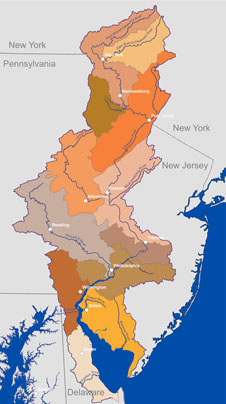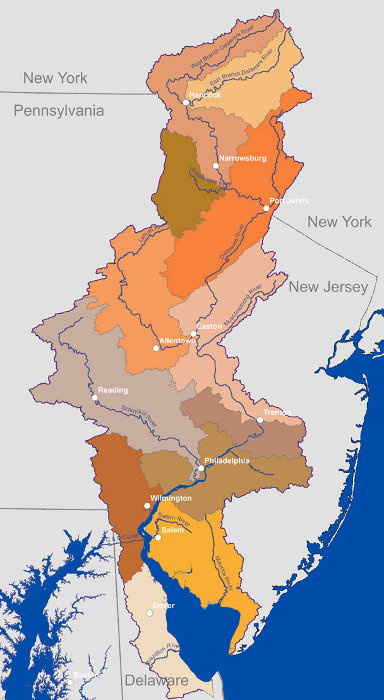Source Water Collaborative Forum
Delaware River Basin Water Resource Protection
Conference Agenda: March 10, 2011
Regional Location: Reading Area Community College
Reading, Pennsylvania
| 7:45am: | Arrival and Registration at Each Location |
| First Session: Live in Philadelphia and Broadcast to All Regional Locations See Main Agenda for First Session Topics | |
| 10:45am - 11:00am: | BREAK |
| Transition to Regional Activities | |
| 11:00am - 11:15am: | Implementing SWP through the Schuylkill Action Network. (Tom Davidock, Partnership for the Delaware Estuary) |
| 11:15am - 11:40am: | Source Water Protection Technical Assistance Program. (Lyn O’Hare, Spotts|Stevens|McCoy) |
| 11:40am - 12:00pm: | Success Stories in Source Water Protection. (Kim Murphy, Berks County Conservancy) |
| 12:00pm - 12:15pm: | Questions and Answers for Panelists |
| Return to Philadelphia for Keynote Live Broadcast and Lunch See Main Agenda for Lunch Session Topic |
|
| 1:30pm: | RETURN TO REGIONAL ACTIVITIES FOR BREAKOUT SESSIONS |
| Transition to Regional Activities | |
| 1:30pm - 3:15pm: | Facilitated discussions of local issue priorities and strategies for local action to protect drinking water quality and quantity. Breakout sessions for particular topics, so attendees can discuss with each other how to move ahead on local action. |
| 3:15pm - 3:30pm: | BREAK AND REGIONAL LOCATION SUMMARY REPORTING TO PHILADELPHIA |
| Return to Philadelphia and Closing | |
| 3:30pm - 4:00pm: | Regional Summary Reports (Vicky Binetti, USEPA Region 3 confirmed) |
| 4:00pm: | ADJOURN |
Speaker: Tom Davidock, SAN Coordinator, Partnership for the Delaware Estuary
Title: “Implementing SWP through the Schuylkill Action Network”
Abstract: Over the past six years, the Schuylkill Action Network (SAN) has completed more than 50 projects addressing some of the biggest threats to source water in the Schuylkill River Watershed. This work includes installation of agricultural management practices on more than 25 farms, the daily treatment of 6.5 million gallons of Abandoned Mine Drainage (AMD), construction of innovative stormwater practices, plus many other activities addressing the restoration and protection of the watershed. The SAN functions through a system of project partners organized by issue-specific workgroups, including Agriculture, Pathogens, Stormwater, Land Protection, and AMD. The SAN has utilized this approach to prioritize projects and leverage funding to strategically implement a source water protection plan for the entire Schuylkill River Watershed. The presentation will report on the SAN's prioritized approach to watershed restoration and highlight the importance of maintaining a coordinated and cooperative effort throughout the watershed. This presentation will also highlight the SAN’s future goals and upcoming initiatives in the Schuylkill Watershed. Additionally, potential partners and stakeholders will learn about opportunities to connect with the SAN and become involved in its issue-specific workgroups.
Bio: Tom works as the Schuylkill Action Network Coordinator for the Partnership for the Delaware Estuary. In this position, he works with a broad range of stakeholders to restore and protect the environmental health of the Schuylkill River Watershed of southeastern Pennsylvania. These partners include academics, businesses, conservation organizations, local municipalities, water suppliers, and state and federal government agencies. Prior to this position, Tom worked as the program director for Delaware Valley Earth Force, an environmental service-learning organization serving southeastern Pennsylvania. He also worked for five years as a natural resource specialist with the Schuylkill County Conservation District on focusing regional watershed restoration and protection.
Speaker: Kimberly J Murphy; President, Berks County Conservancy
Title: “Success Stories in Source Water Protection”
Abstract: Protecting drinking water in the Delaware River Basin is achieved through watershed planning, regulatory oversight, and on-the-ground implementation of source water protection and restoration projects. The Berks County Conservancy has a long history of overseeing the protection and restoration of the water resources of Berks County. More than 25% of Berks County’s stream and rivers have been designated as impaired, primarily due to agriculture runoff. Combating this problem has required a substantial investment of time and resources in improving agriculture practices on many Delaware Basin farms. While there is still a significant amount of work left to do, successes can be noted in both water quality improvements, changes in agriculture land management practices, and through the formation of new and lasting partnerships. In a growing and changing environment, an additional threat to source water is our changing landscapes, where farm and forests are being converted to homes and shopping centers. The Berks County Conservancy has been working to protect the land resources of the Basin, which are critical for the protection of our water resources. Through land protection, regional planning, and municipal engagement activities, the Berks County Conservancy has been able to realize successes in the protection of critical watershed lands. This presentation will highlight many of these successes and the strategies employed to accomplish them. This presentation will also demonstrate the importance of working cooperatively to achieve the regional implementation of watershed-wide goals.
Bio: Kim joined Berks County Conservancy in January 2004. As president, she works with a dedicated staff to improve and protect our land and water resources, to educate the community about land use and its implications, and to preserve historic structures in the community. The conservancy’s overall mission is to be the leading agent for the conservation of the environment in Berks County; thus, conserving Berks County's unique cultural and environmental resources for the benefit of future generations.
To fulfill that mission, Kim and her team have focused on preserving agricultural land , forests and open space; protecting the quality of our streams and ground water; preserving historic landmarks and scenic landscapes; and by promoting those values that contribute to a sustainable future for our community. The Conservancy has been recognized by the Greater Reading Chamber of Commerce as the outstanding not-for-profit of the year. Before joining the Conservancy, Kim spent nearly 12 years as director of development at Penn State where she managed the development, alumni and university relations programs for both the Berks Campus in Reading and the Lehigh Valley Campus in Fogelsville. Through her work at Penn State, she earned the credential of Certified Fund Raising Executive (CFRE) as designated by the Association of Fund Raising Professionals.
Speaker: Lyn O’Hare, Water Resources Specialist, SSM Group, Inc.
Title: “Achieving Watershed Improvements Though Source Water Protection”
Abstract: Berks County comprises 40% of the overall Schuylkill River Watershed, and has a large impact on source water protection for both the watershed and the drinking water. Approximately 36% of the Berks land use is in agriculture, which has added sediment and nutrient impairments to the river and its tributaries. Two programs have had great influence on source water protection in this area: the Schuylkill Action Network, and the DEP’s Source Water Protection Technical Assistance Program (SWPTAP).
The Schuylkill Action Network has an active Agricultural Workgroup, which meets quarterly to discuss issues and formulate projects that provide watershed improvements on farms. The SWPTAP program provides the financial and technical assistance to water systems to develop a specialized Source Water Protection Plan that helps with management strategies targeted towards their individual drinking water sources. The Reading Area Water Authority and the Western Berks Water Authority are just two of the systems actively involved in source water protection in Berks County that struggle with a variety of issues in water quality improvement and watershed restoration.
The issues facing these groups are very similar to ones experienced by a large number of other communities located throughout the Delaware River Basin. This presentation will focus on the challenges, solutions, and leadership opportunities currently proposed and implemented by local water systems and environmental groups, including ongoing water quality data collection and multiple partnerships that form the foundation of sustainable source water protection.
Bio: Lyn is responsible for source water protection studies, watershed management, and business development. She has more than twenty years of environmental management experience, and is also active in the Schuylkill Action Network and the Society of Women Environmental Professionals.
Adobe Flash Player is required to view the webcast click here to download the plugin. Try this test video to see if your computer meets the requirements to view the recorded broadcast.
View the recorded broadcast here: http://vimeo.com/23006805


